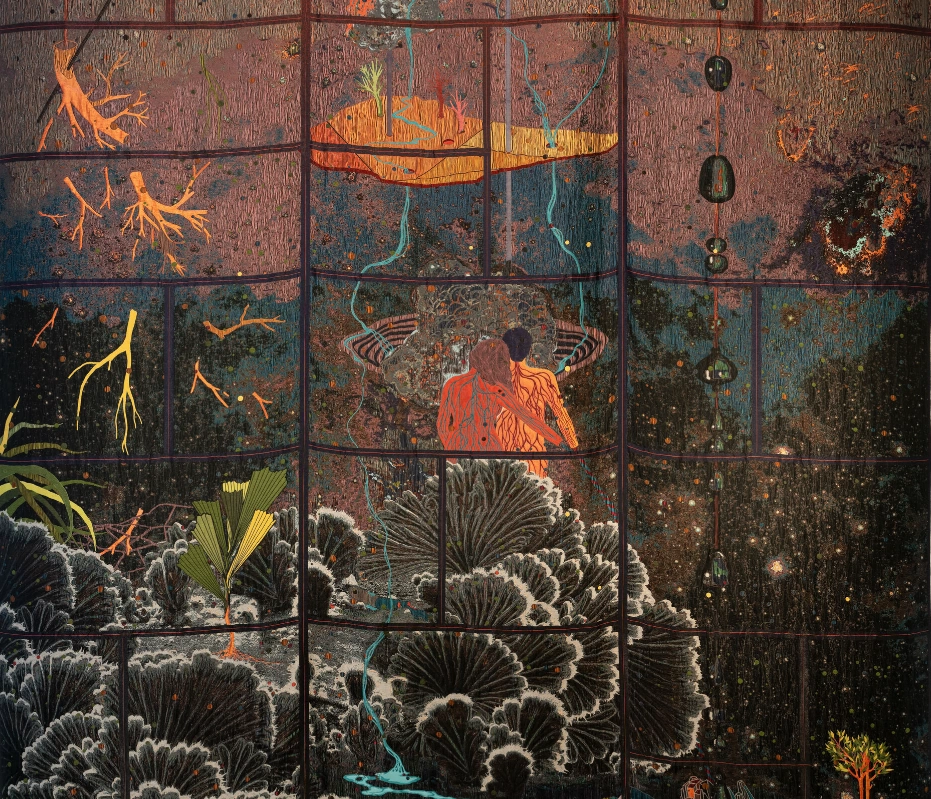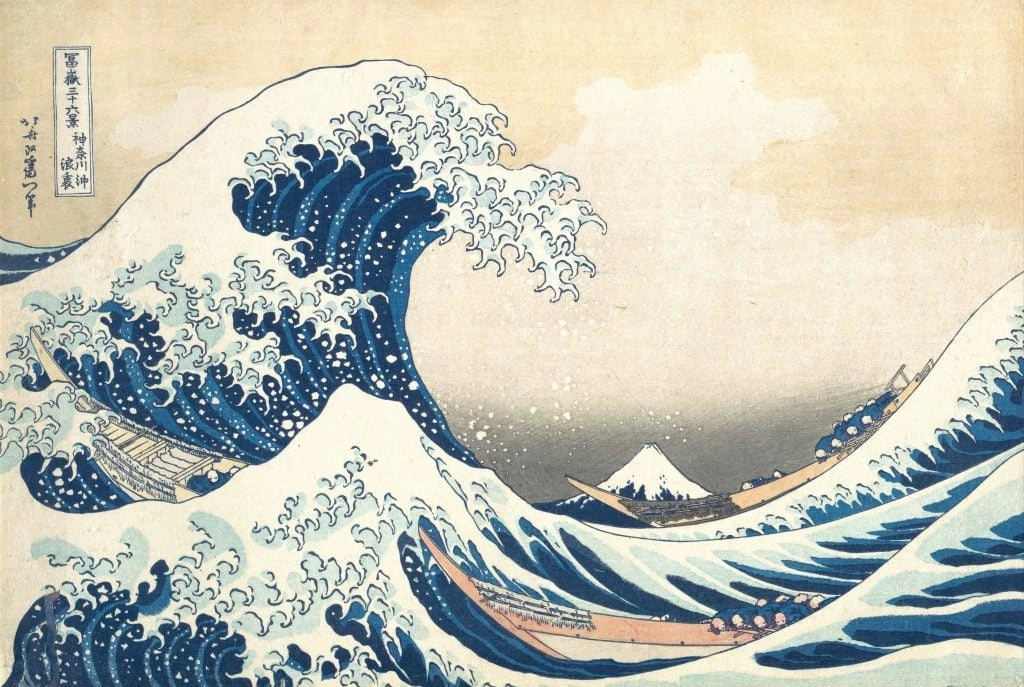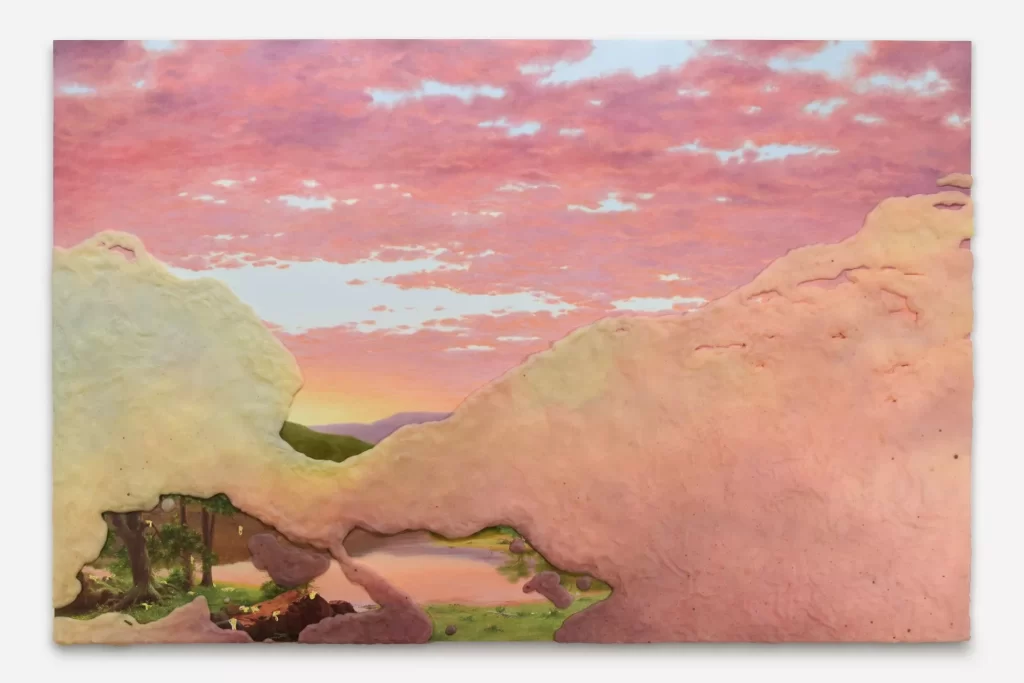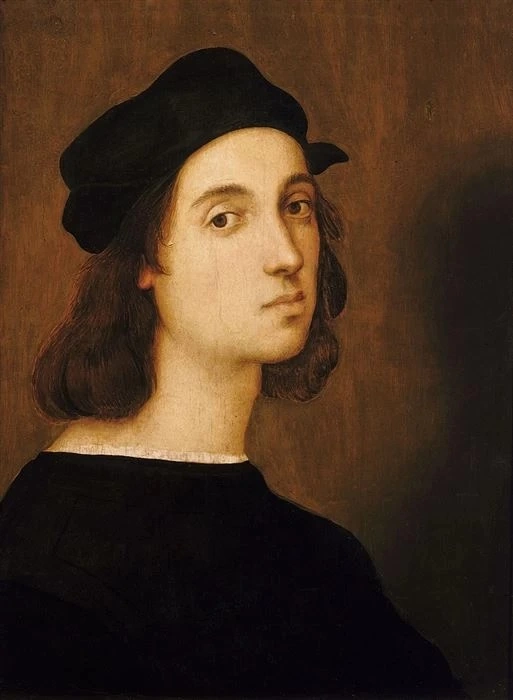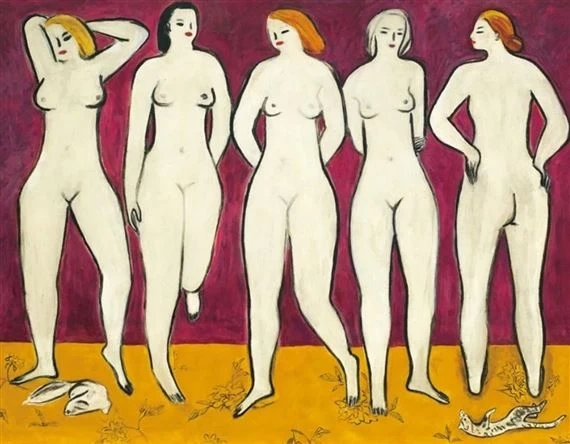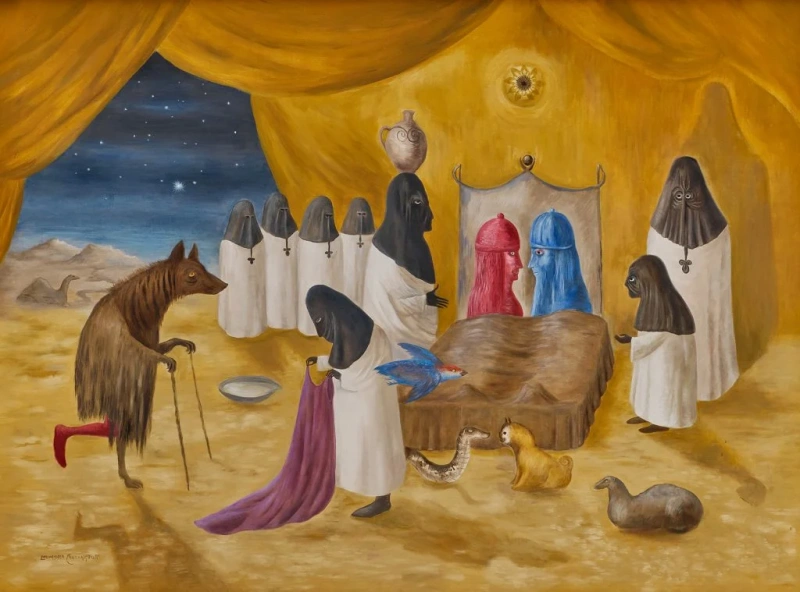While 2022 at auction was a “return to routine” after the COVID-19 pandemic, 2023 was a year of more subdued action under the hammer.
This year, the top 100 lots at auction totaled $2.4 billion, a notable drop from $4.1 billion in 2022. In this environment, two artworks sold for over $100 million—Pablo Picasso’s Femme à la montre (1932) and Gustav Klimt’s Dame mit Fächer (Lady with a Fan) (1917)—compared to six works in 2022. Just three of the top 50 most expensive sales at auction in 2023 were works by female artists—Louise Bourgeois, Georgia O’Keeffe, and Joan Mitchell—compared to zero last year.
The tentpole auction seasons across the year offered a mixed bag. New York City’s May auction season sold nearly $2 billion worth of art and was marked by a series of late withdrawals and some below-estimate sales. The variable bidding behavior continued into the summer for London’s auction season in June, and, later in the year, November’s tentpole auction season in New York did little to ease worries. According to ArtTactic, the total of the evening sales across the fortnight was an increase of 30% on the May sales, but 31% down on 2022’s November season, which featured the Paul Allen sale at Christie’s—the most expensive auction in history.
Still, this was a year that yielded its fair share of blockbuster results and significant auction records. Names including Hedda Sterne, Agnes Martin, Jadé Fadojutimi, and El Anatsui were among those to set new benchmarks under the hammer. Here, we run down the top 10 lots at auction in 2023.
Pablo Picasso, Femme à la montre, 1932
139,363,500 USD
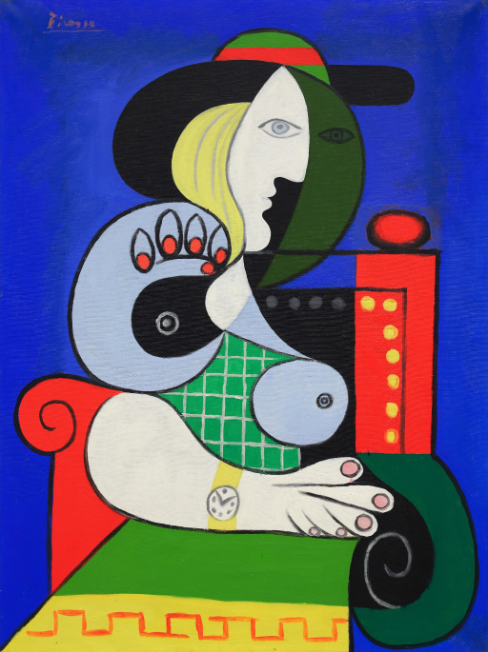
Pablo Picasso, ‘Femme à la montre’, 1932.
Courtesy of Sotheby’s.
Some 50 years after the passing of Pablo Picasso, the artist’s 1932 painting Femme à la montre emerged as the most expensive artwork sold at auction this year, hammering $139.4million as part of Sotheby’s $400 million sale of works from the collection of the late philanthropist Emily Fisher Landau. The work is the second most expensive by Picasso to be sold at auction after Les femmes d’Alger (Version ‘O’) (1955) sold for $179.4 million in 2015.
The painting, measuring 51 by 38 inches, is a Cubist portrayal of Marie-Thérèse Walter, Picasso’s mistress and muse. Known as his “golden muse,” Walter’s representation in the painting is more than a mere portrait; it’s a glimpse into the complex layers of Picasso’s life during his marriage to the Russian-Ukrainian ballerina Olga Khokhlova.
The painting is a testament to Picasso’s love for and fascination with Walter, appearing in several other works, including Femme nue couchée (1932), which sold for $67.5 million in 2022.
Gustav Klimt, Dame mit Fächer (Lady with a Fan), 1917
106,756,354 USD
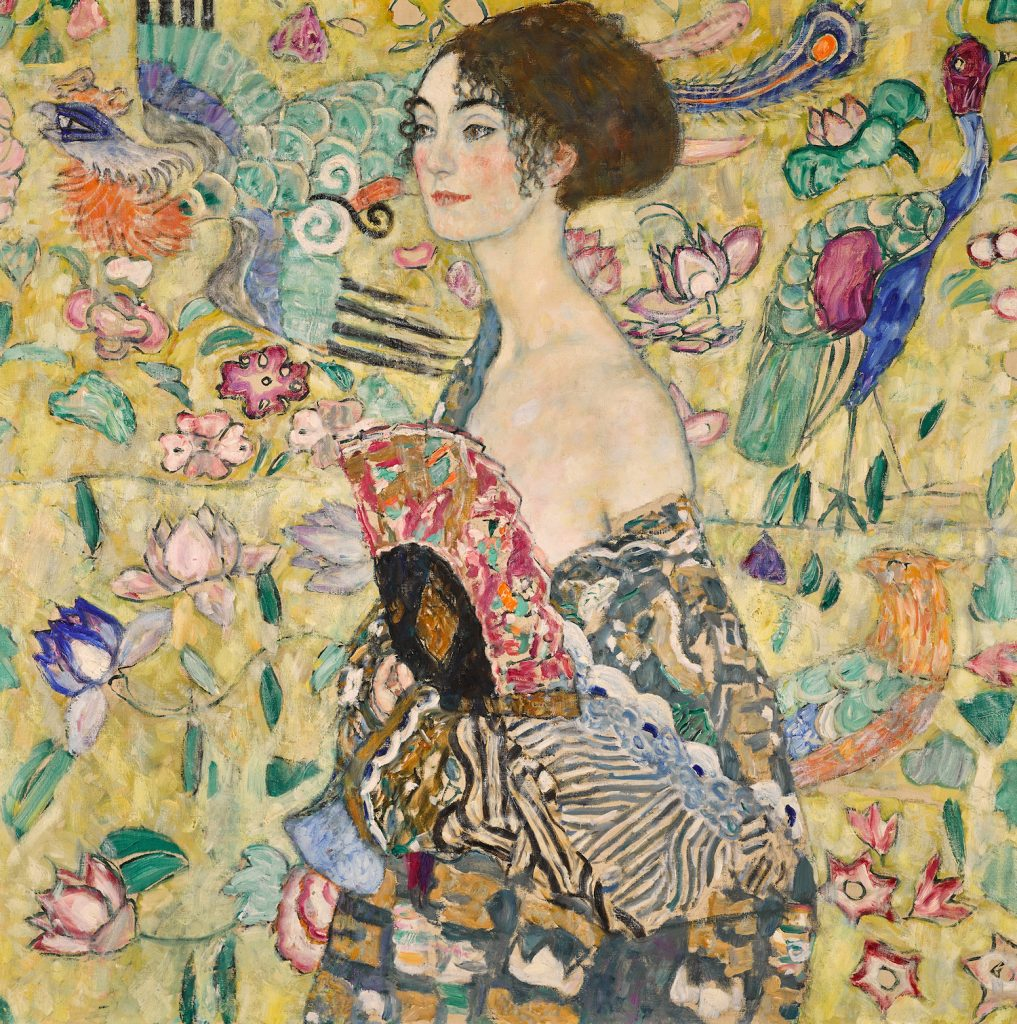
Gustav Klimt, Dame mit Fächer (Lady with a Fan), 1917.
Courtesy of Sotheby’s.
Deemed “the star of the summer auction season in London” by Sotheby’s, Gustav Klimt’s final portrait, Dame mit Fächer (Lady with a Fan), was still on the easel when the artist suddenly passed away in 1918. This painting, featuring an unnamed woman engulfed by flowers and peacocks, became the most expensive artwork ever sold at a European auction house, fetching £85.3 million ($106.8 million) at Sotheby’s London modern and contemporary evening auction this summer.
The work also set a new record under the hammer for the Austrian artist, beating the $104 million paid for Birch Forest (1903) at Christie’s in November 2022. The work’s ascension since its last appearance at auction is remarkable: Dame mit Fächer (Lady with a Fan) was previously sold under the hammer in 1994 for $11.6 million.
Claude Monet, Le bassin aux nymphéas, 1919
74,010,000 USD
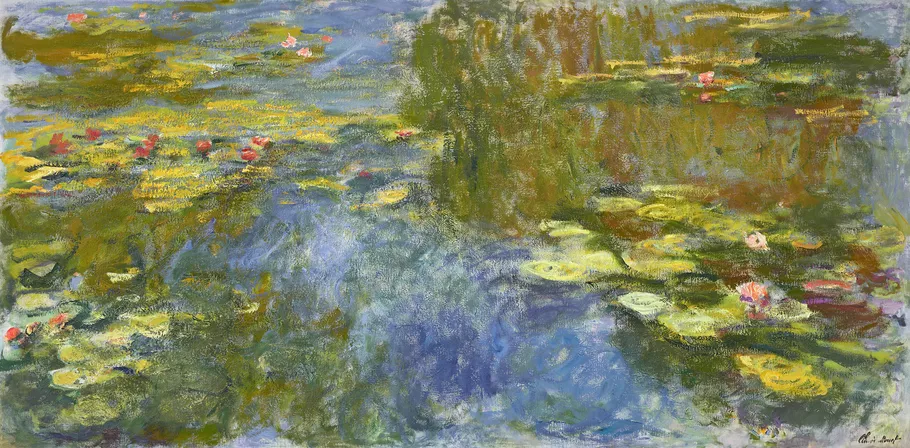
Claude Monet, Le bassin aux nymphéas, 1919. Courtesy of Christie’s Images Ltd. 2023.
As Claude Monet approached 80, the famed Impressionist worked on Le bassin aux nymphéas (1919) with two cataracts in his eyes. As a landmark of late Impressionism, the breathtaking painting envisions a landscape where the sky and water merge as one blue hue, with the water lilies offering the only spatial marker.
Toppling its projected estimate of $65 million, the painting fetched $74 million at Christie’s Impressionist and modern art evening sale in New York this November. Before the sale, Le bassin aux nymphéas had never been presented in an exhibition or offered at auction. The “undiscovered” work was held privately in the same family collection for more than 50 years and is the sixth-most expensive work by the artist to have sold at auction. That record is held by Meules (1890), which sold at Sotheby’s for $110.7 million in 2019.
Jean-Michel Basquiat, El Gran Espectaculo (The Nile), 1983
67,110,000 USD
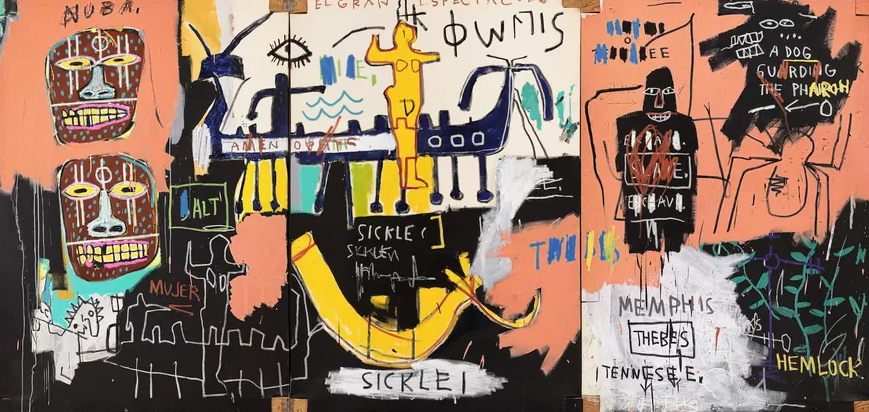
Jean-Michel Basquiat, El Gran Espectaculo (The Nile), 1983.
Courtesy of Christie’s Images Ltd. 2023.
El Gran Espectaculo (The Nile), a 1983 triptych from Jean-Michel Basquiat, conflates the histories of ancient Egypt and the Southern United States, offering a critique of the exploitation of Black people through history, reflecting on slavery in both ancient Egypt and pre–civil war U.S.
The work achieved $67.1 million at Christie’s 21st-century evening sale in May, accounting for more than two-thirds of the $98.2 million combined sales that were achieved during the sale. Additionally, the final price for the Basquiat painting soared above its $45 million estimate. It’s the fourth-most expensive artwork by the artist at auction. That record is held by Untitled (1982), which sold at Sotheby’s for $110.5 million.
In an indication of just how much the secondary market has skyrocketed for works by Basquiat, El Gran Espectaculo (The Nile) was last purchased by fashion designer Valentino Garavani at Sotheby’s in 2005 for $5.2 million—then deemed a “high price” for a work by the artist at the time. Part of the proceeds from the sale of the work were distributed to Accademia Valentino, a Rome-based organization uplifting art and fashion education.
Gustav Klimt, Insel im Attersee (Island in the Attersee), circa 1901
53,188,500 USD
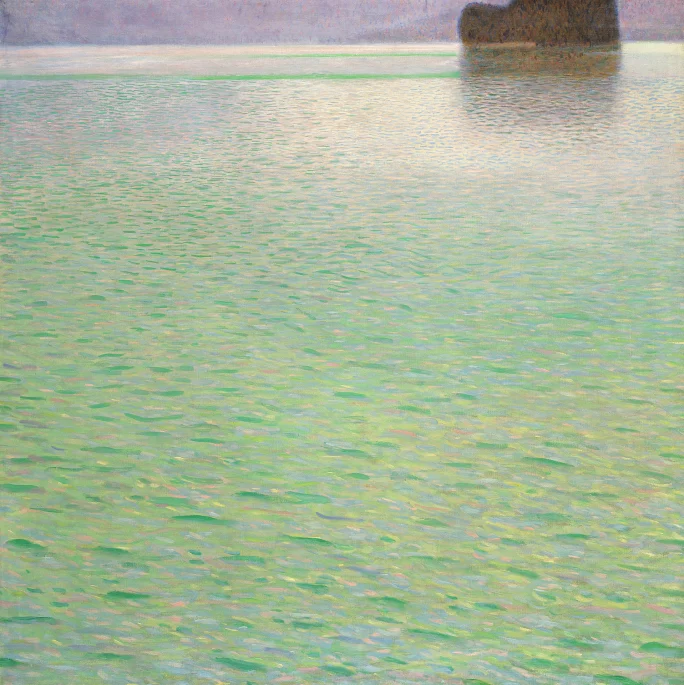
Gustav Klimt, Insel im Attersee, circa 1901. Courtesy of Sotheby’s.
The sale of this work makes Gustav Klimt the only artist on this list to appear twice. Insel im Attersee (Island in the Attersee) (ca. 1901) sold at Sotheby’s modern evening auction in New York for $53.2 million, weeks before the sale of Dame mit Fächer (Lady with a Fan) (1917).
Insel im Attersee (Island in the Attersee) was originally part of the collection of the Austrian art historian Otto Kallir. It was featured in the 1940 exhibition “Saved from Europe” at Galerie St. Etienne in New York, a key event in the introduction of Klimt’s oeuvre to North American artists.
Insel im Attersee (Island in the Attersee) is among the numerous artworks Klimt crafted using his distinctive square format. This painting, in particular, was conceived at Lake Attersee in Austria and is one of two Klimt paintings from the same vantage point. The other, Attersee (1900), resides in the Leopold Museum in Vienna.
Francis Bacon, Figure in movement, 1976
52,160,000 USD
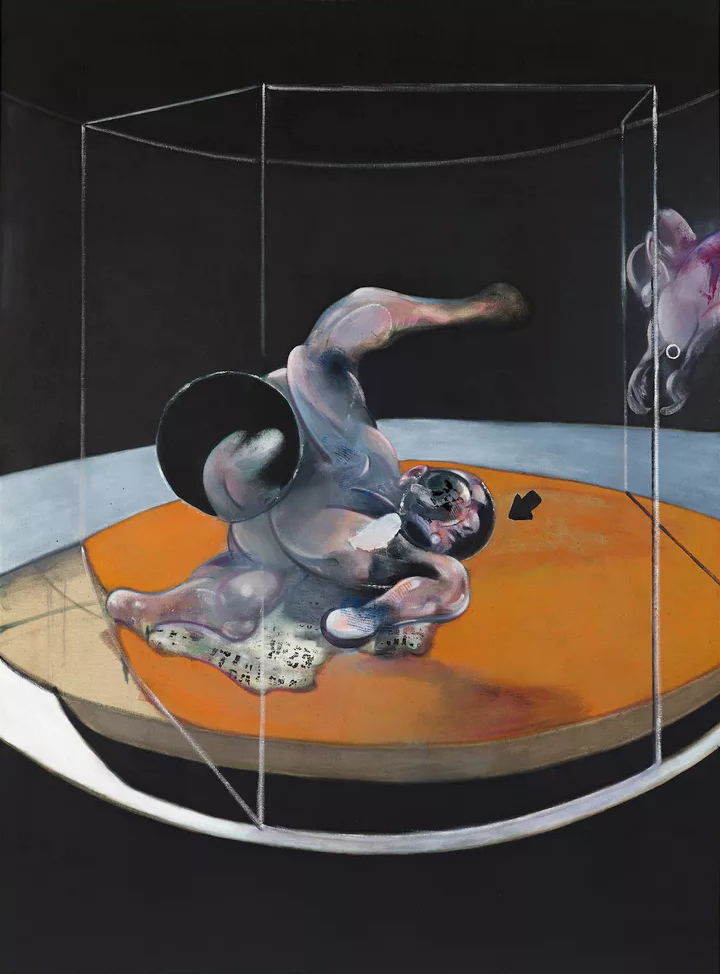
Francis Bacon, Figure in movement, 1976.
Courtesy of Christie’s Images Ltd. 2023.
This Francis Bacon masterwork is a testament to the artist’s ability to embrace turbulence in memory and loss through distorted figuration. The painting, depicting two figures wrestling within a transparent cube, is inspired by the sudden 1971 passing of George Dyer, with whom he had a tumultuous relationship. Above the figures, Bacon paints a hovering “fury”—a mythological creature commonly associated with loss, vengeance, and guilt.
Figure in Movement (1976) fetched $52.2 million this November at Christie’s 20th-century evening sale in New York. The six-and-a-half-foot-tall canvas had never been to auction and was held privately for the last 50 years. It’s the seventh-highest price for a work by the artist under the hammer: Bacon’s 1969 triptych Three Studies of Lucian Freud became the most expensive when it sold for $142.4 million at Christie’s a decade ago.
Richard Diebenkorn, Recollections of a Visit to Leningrad, 1965
46,410,000 USD
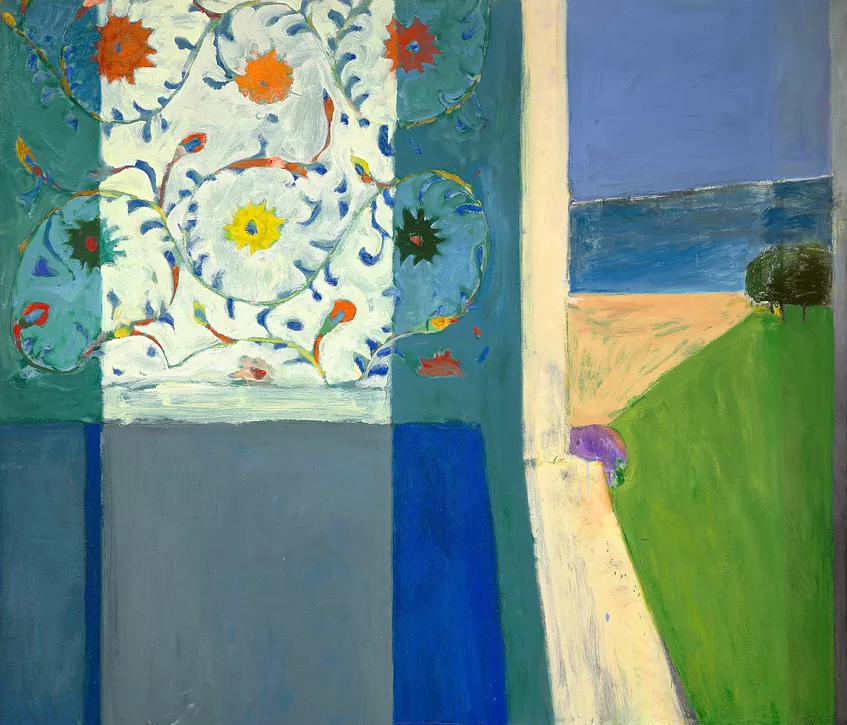
Richard Diebenkorn, Recollections of a Visit to Leningrad, 1965.
Courtesy of Christie’s Images Ltd. 2023.
Recollections of a Visit to Leningrad (1965), a monumental Richard Diebenkorn painting inspired by Henri Matisse, sold for $46.4 million at Christie’s 20th-century evening sale this November. This sale far exceeded the artist’s previous auction record, held by Ocean Park #40 (1971), which sold at Sotheby’s in 2021 for $27.3 million.
Recollections of a Visit to Leningrad was conceived when Diebenkorn visited the Soviet Union in the 1960s and encountered several Matisse paintings in person for the first time. This experience sparked a stylistic shift for the American artist, whose paintings began to incorporate sharp geometric images filled with bright, vibrant colors. This painting also marks a continuation of the artist’s exploration of interior and exterior spaces, first seen in works such as Woman on a Porch (1956).
Mark Rothko, Untitled (Yellow, Orange, Yellow, Light Orange), 1955
46,410,000 USD
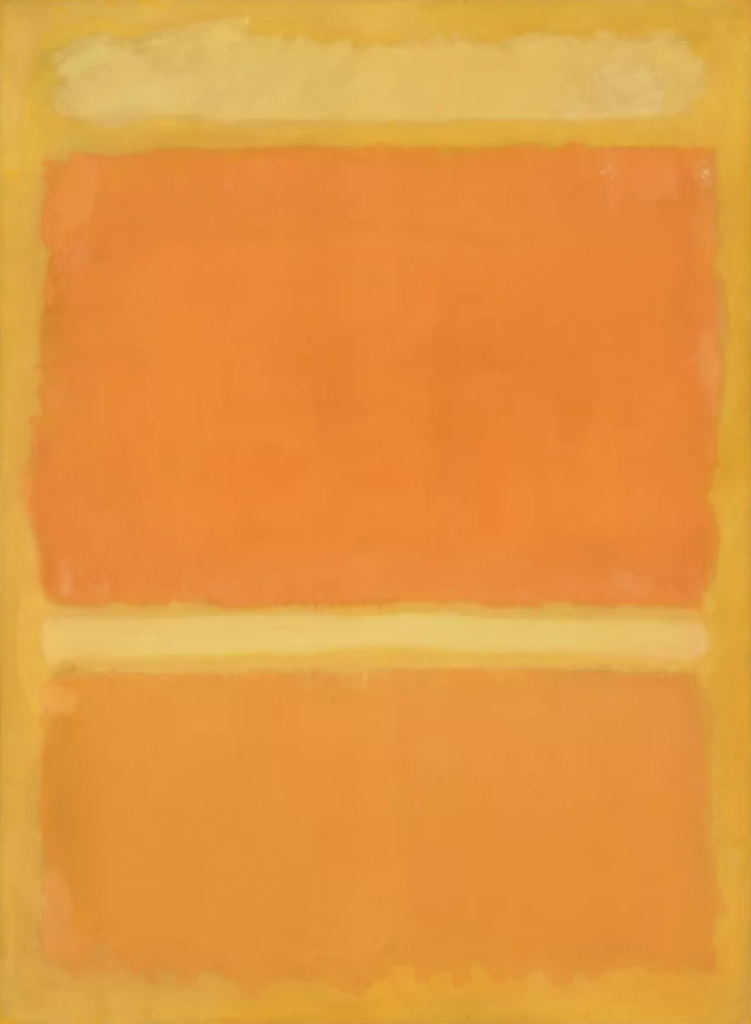
Mark Rothko, Untitled (Yellow, Orange, Yellow, Light Orange), 1955.
Courtesy of Christie’s Images Ltd. 2023.
Mark Rothko’s imposing golden Untitled (Yellow, Orange, Yellow, Light Orange) (1955) was painted in the same year as the artist’s first solo exhibition at New York’s Sidney Janis Gallery, and was inspired by the artist’s experiences of viewing Old Master works on a trip to Europe. The near-seven-foot work is one of 22 paintings completed by the artist that year—more than half of those are in major museum collections.
The sale of the work for $46.4 million at Christie’s in November marks a $10 million increase in value over the past decade: Sotheby’s sold the painting in 2014 for $36.5 million from the collection of Paul and Bunny Mellon. It’s a testament to the artist’s enduring place in the market and relevance today. Rothko is currently the subject of a massive retrospective at the Fondation Louis Vuitton, on view until February 4, 2024.
Wassily Kandinsky, Murnau mit Kirche II (Murnau with Chirch II), 1910
44,758,691 USD
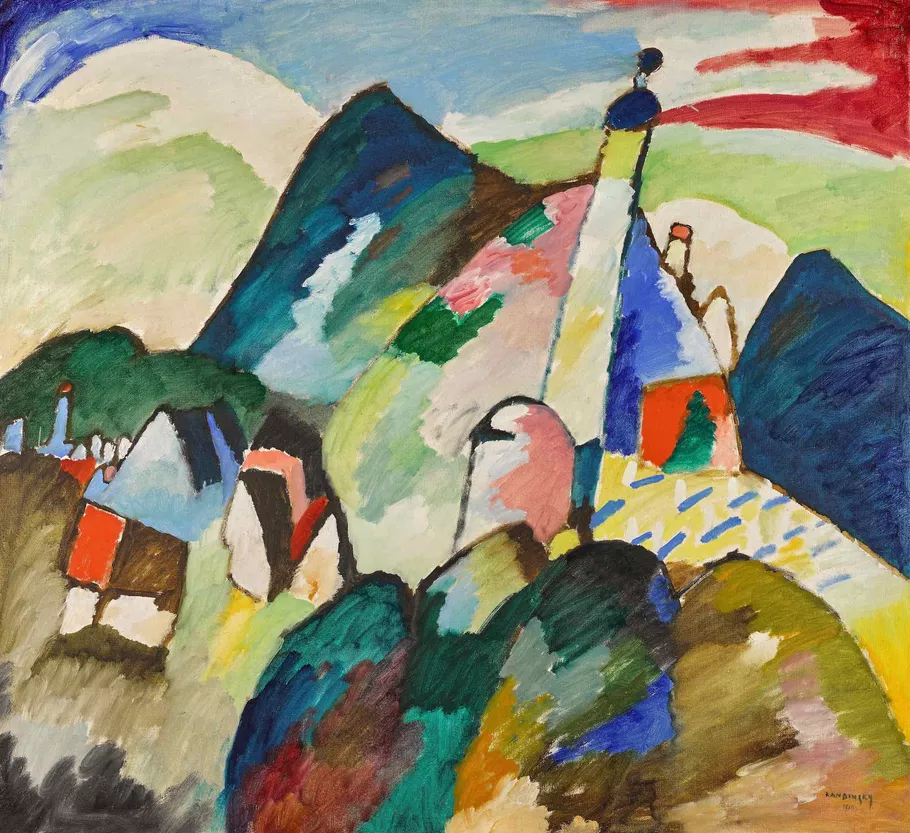
Wassily Kandinsky, Murnau mit Kirche II (Murnau with Church II), 1910.
Courtesy of Sotheby’s.
Wassily Kandinsky’s 1910 painting of the German village of Murnau, Murnau mit Kirche II (Murnau with Church II), garnered significant attention early in the year, fetching £37.197 million ($44.8 million) at Sotheby’s London modern and contemporary evening auction in March. Created when Kandinsky was 44, this landscape painting marks the Russian artist’s transition towards abstraction. The painting depicts the town’s church spire above the mountains, situated in a vibrantly colored landscape.
Once a decoration in textile company owners Johanna Margarethe Stern-Lippmann and Siegbert Stern’s dining room, the painting was stolen by the Nazis in the 1930s and was discovered almost a decade ago at the Van Abbemuseum in Eindhoven, where it had resided since 1951. The sale of the work marked a new record for the artist at auction, and, according to The Guardian, the descendants of the family said that some of the proceeds from the sale will go towards tracking down more of the family’s art collection that was seized by the Nazis in the 1930s.
Henri Rousseau, Les Flamants, 1910
43,535,000 USD
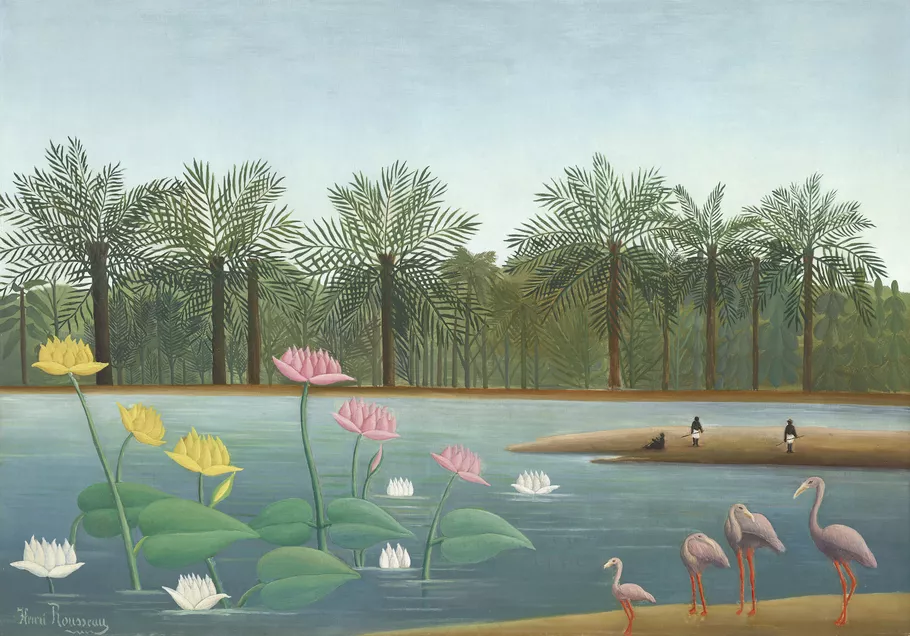
Henri Rousseau, Les Flamants, 1910. Courtesy of Christie’s Images Ltd. 2023.
The sale of Henri Rousseau’s Les Flamants (1910) beat the French artist’s existing auction record more than 10 times over when it sold for $43.5 million at Christie’s May 20th-century evening sale in New York. The artist’s prior record at auction of $4 million was set in 1993 for Portrait of Joseph Brummer (1909).
Painted in the final year of Rousseau’s life, Les Flamants is one of almost two dozen tropical jungle paintings that the artist produced. The artist first focused on tropical landscapes in 1891, with Surpris! (Tigre dans une tempête tropicale). However, after the turn of the century, Rousseau devoted his time to the lush and mythical landscapes, filled with striking plant and animal life. Les Flamants depiction of giant flowers towering over flamingos and people reflects his imaginative and dreamlike approach to landscape art, which would influence artists throughout the 20th century.
Written by Maxwell Rabb
Source: Artsy


